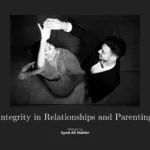Restoring Trust and Protecting Peace in Relationships
Maintaining Peace in relationships can often feel like walking a tightrope, especially when trust has been broken or when dealing with complex personalities. Whether you’re striving to rebuild trust or protect your mental health from manipulative behavior, this guide offers actionable steps to find balance and Peace in your relationships.
Stop Investigating All the Time in Relationships
How Constant Investigating Harms Your Peace
Revisiting your partner’s mistakes repeatedly can shatter your mental well-being. Trust is delicate, and when you obsessively dig into the past, you create a never-ending cycle of doubt and insecurity. This not only impacts your Peace of mind but also prevents the relationship from moving forward.
Why Space and Proving Loyalty Go Hand-in-Hand
Giving your partner space is a cornerstone of rebuilding trust. While transparency remains crucial, you must allow them the opportunity to prove their loyalty through consistent actions rather than under constant scrutiny. Trust grows when both partners invest in moving forward rather than dwelling on past mistakes.
Steps to Rebuild Trust and Peace
1. Stop Investigating: Avoid questioning past incidents repeatedly—it only fuels negativity.
2. Encourage Transparency: Set expectations for open communication without micromanaging.
3. Focus on Positivity: Prioritize creating positive experiences together to rebuild trust.
4. Seek Professional Guidance: If past wounds are deep, consider therapy to help both partners heal.
When a Narcissist Plays the Victim
Decoding Narcissistic Tactics
Narcissists often avoid accountability by playing the victim. Even when confronted with irrefutable evidence, they deflect blame and manipulate the narrative to make themselves appear vulnerable. This tactic is designed to guilt-trip and confuse you, making it essential to recognize these behaviors to safeguard your Peace.
The Emotional Cost of Confrontation
Arguing with a narcissist is usually futile. They twist facts, invalidate your feelings, and drain your emotional energy. Repeated confrontations can rob you of your inner peace, leaving you frustrated and mentally exhausted.
The Strength in Walking Away
Sometimes, choosing not to engage is the wisest choice. Walking away doesn’t mean surrendering; it means valuing your Peace of mind over the need to be right. Recognizing when to disengage can save you from prolonged emotional turmoil.
How to Cultivate Peace in Relationships
Whether you’re navigating trust issues or managing difficult dynamics, protecting your peace should always be a priority. Here’s how you can achieve it:
1. Stop Overthinking Past Mistakes: Focus on the present and future, not the past.
2. Understand Manipulative Behaviors: Learn to identify guilt-tripping or victim-playing.
3. Set Healthy Boundaries: Protect your mental health by knowing when to step back.
4. Foster Trust Through Actions: Trust grows through consistent, positive actions—not through endless questioning.
5. Prioritize Your Mental Health: Seek help from a counselor or therapist when needed.
Why Peace is Essential in Relationships
Peace isn’t just the absence of conflict; it’s a state of mental and emotional stability that allows you to thrive in your relationships. Trust can only flourish when Peace exists, and mental well-being should always be your top priority. By focusing on constructive communication, understanding manipulative behaviors, and setting healthy boundaries, you can achieve lasting peace and harmony in your relationships




